APRIL 16 — The story unfolds with the application of three turncoat members of the Perak Legislative Assembly for a declaration that Speaker V. Sivakumar’s order, which was made in the Legislative Assembly, that their seats in the Assembly have become vacant because they have resigned was illegal. Here is the report from theSun newspaper, Thursday, April 2, 2009:
IPOH: The High Court yesterday dismissed the application by Perak State Assembly Speaker V. Sivakumar to strike out an original summons brought by the three independent assemblymen, seeking a declaration that Sivakumar’s order to declare their assembly seats vacant was illegal.
Justice Datuk Balia Yusuf Wahi set April 8 to hear the suit by the assemblymen Mohd Osman Mohd Jailu (Changkat Jering), Jamaluddin Mohd Radzi (Behrang) and Hee Yit Foong (Jelapang) against the speaker.
He also dismissed an application by three former Pakatan Rakyat state executive councillors … and three registered voters to intervene in the case, ruling that they are not interested parties as claimed.
Sivakumar had declared the three state seats vacant based on their pre-dated resignation letters as the three assemblymen were formerly from the ruling coalition. Their resignation from their parties caused the balance of power to shift to Barisan Nasional.
Sivakumar had informed the Election Commission (EC) to call for fresh elections for these three seats but the EC declined and said the seats were not vacant.
The three assemblymen then referred their suit to the High Court here for a ruling that they had not vacated their seats as declared by Sivakumar.
I don’t have to tell you how to judge the judge. You must know by now how to do it if you have read my articles in the Internet. You will know he is a bad judge if he behaves unfairly to one side as against the other. It is your perception as a member of the public that matters and not what the judge thinks of himself. A judge who does not appear to be fair is useless to the judicial process. As such he is a bad judge and is therefore unfit to sit on the bench. The other essential qualification of a judge is to administer justice according to law. That said, we can now judge this judge.
Article 72, Clause (1) of the Federal Constitution clearly states:
72. (1) The validity of any proceedings in the Legislative Assembly of any State shall not be questioned in any court.
Yet Mr Justice Balia Yusuf Wahi, who knew that the Speaker’s order which was made in the Legislative Assembly was a proceeding in the Legislative Assembly, dismissed the Speaker’s application to strike out the summons of the three turncoat assemblymen who were asking the court to question the validity of what the Speaker had done in the Assembly. As you know what the Speaker did in the Assembly, rightly or wrongly, is not to be questioned in any court. Isn’t what the judge had done by dismissing the Speaker’s application to strike out the turncoats’ summons, not administering justice according to law? The judge had gone against the Constitution of Malaysia which is the supreme law of the land. What do you call a judge who has defied the law of the land? A renegade judge?
There is another thing. Why did the judge dismiss the application of the three voters from the Behrang, Changkat Jering and Jelapang constituencies, who claimed that their rights were affected because they had voted for the DAP and PKR? They were not allowed to intervene because they were not interested parties ruled the judge. Why are they not interested parties? The voters have voted for them as their representatives in the Legislative Assembly because they were DAP and PKR candidates. Now the turncoats have reneged on the arrangement on which they have stood for election on a DAP or PKR ticket. Such an arrangement has formed the basis of an underlying assumption on which they have conducted the dealings between them. Therefore, they would not be allowed to go back on that assumption when it would be unfair or unjust to allow them to do so. In other words, it would be unfair or unjust to allow them to say that they are no longer DAP or PKR members but are independent members of the Assembly. The authority for what I have just said is so well known that I am surprised the judge had chosen to ignore it. The case is Boustead Trading (1985) Sdn Bhd v. Arab-Malaysian Merchant Bank Bhd [1995] 3 M.LJ. 331, F.C., where Gopal Sri Ram JCA sitting in the Federal Court gave the judgment of the Court. He said, p. 344:
The time has come for this court to recognize that the doctrine of estoppel is a flexible principle by which justice is done according to the circumstances of the case. It is a doctrine of wide utility and has been resorted to in varying fact patterns to achieve justice. Indeed, the circumstances in which the doctrine may operate are endless.
And at p. 345, he went on to say:
The width of the doctrine has been summed up by Lord Denning in the Amalgamated Investment case ([1982] 1 Q.B. 84 at p. 122; [1981] 3 All E.R. 577 at p. 584; [1981] 3 W.L.R. 565 at p. 575) as follows:
“The doctrine of estoppel is one of the most flexible and useful in the armoury of the law. But it has become overloaded with cases. That is why I have not gone through them all in this judgment. It has evolved during the last 150 years in a sequence of separate developments: proprietary estoppel, estoppel by representation of fact, estoppel by acquiescence, and promissory estoppel. At the same time it has been sought to be limited by a series of maxims: estoppel is only a rule of evidence, estoppel cannot give rise to a cause of action, estoppel cannot do away with the need for consideration, and so forth. All these can now be seen to merge into one general principle shorn of limitations. When the parties to a transaction proceed on the basis of an underlying assumption — either of fact or of law — whether due to misrepresentation or mistake makes no difference - on which they have conducted the dealings between them - nether of them will be allowed to go back on that assumption when it would be unfair or unjust to allow him to do so. If one of them does seek to go back on it, the courts will give the other such remedy as the equity of the case demands.” (Emphasis added)
So the judge Balia Yusuf Wahi had wrongly ruled that the three voters were not interested parties. The voters’ interest in the matter is that they have a right to insist on the persons whom they have voted to be their elected DAP or PKR representatives not to change sides by switching to the other political coalition Barisan Nasional. “When the parties to a transaction proceed on the basis of an underlying assumption on which they have conducted the dealings between them neither of them will be allowed to go back on that assumption when it would be unfair or unjust to allow him to do so. If one of them does seek to go back on it, the courts will give the other such remedy as the equity of the case demands.”
We know that the judge had adjourned the hearing of the suit by the turncoat assemblymen to April 8. But to our amazement we were told by the newspaper that the turncoats have also made two applications to the Federal Court on Friday, that was Friday, April 3, for two declarations, viz:
Whether, on a true interpretation of article 36(5) of the Laws of Perak Darul Ridzuan (Perak Constitution) read together with section 12(3) of the Election Act 1958, the Election Commission is the rightful entity which establishes if there is a casual vacancy of the state legislative assembly seat.
When a resignation of a member of the Perak state legislative assembly is disputed, is such resignation within the meaning as ascribed under article 35 of the Perak Constitution.
If they have applied to the Federal Court for a determination, then it is only proper to inform the High Court and the other side about it. So that what is pending in the High Court could be adjourned until the Federal Court has decided on the questions that have been referred to it.
Then on Friday, April 10, the New Straits Times carries this report:
PUTRAJAYA: The Federal Court has declared that three assemblymen who quit their parties are still members of the Perak state legislature. This follows an unanimous ruling by a five-men bench yesterday which ruled that the Election Commission had the authority to declare a seat vacant.
“The Election Commission is the rightful entity to establish if there was a casual vacancy in the Perak state legislature,” said Federal Court judge Tan Sri Alauddin Mohd Sheriff. Sitting with him were Datuk Arifin Zakaria, Datuk Nik Hashim Nik Abdul Rahman, Datuk Sen S Augustine Paul and Datuk James Foong.
Last month, Parti Keadilan Rakyat’s Jamaluddin Mohd Radzi (Behrang) and Mohd Osman Jailu (Changkat Jering), together with DAP’s Hew Yit Foong (Jelapang), filed an urgent application for the Federal Court to decide their matter. The three wanted a declaration whether it was the Election Commission or the Perak Speaker (V Sivakumar) had the final say in determining a vacancy.
In February, Sivakumar, using resignation letters signed by the three, had declared the seats vacant. He informed the Election Commission, but the commission refused to hold by-elections on the ground that there was ambiguity over whether the assemblymen had resigned voluntarily.
Was the Federal Court right? Before you can judge the judges of the highest court in the country, it is necessary for me to appraise you of the law applicable which is found in the Constitution of Perak. Thus, the heading of Article XXXI of the Perak Constitution reads:
Disqualification for membership of Legislative Assembly
XXXI. (1) Subject to the provisions of this Article, a person is disqualified for being a member of the Legislative Assembly if-
(a) [he is of unsound mind]; (I have summarised the paragraph)
(b) he is an undischarged bankrupt;
(c) he holds office of profit;
(d) [he has failed to lodge any return of election expenses within time]; (I have summarised the paragraph)
(e) [he has been convicted of an offence and sentenced to imprisonment of not less than one year or to a fine of not less than RM2,000]; (I have summarised the paragraph)
(f) [disqualification involving election offences]; (I have summarised the paragraph)
(g) [he has acquired the citizenship of another country] (I have summarised the paragraph)
(2) [The disqualification of a person under paragraphs (d) or (e) above may be removed by the Sultan or ceased at the end of five years] (This is a summary)
(3) …
(4) …
(5) A person who resigns his membership of the Legislative Assembly of this State or any other State shall, for a period of five years beginning with the date on which his resignation takes effect, be disqualified from being a member of the Legislative Assembly of this State.
So that it is clear to all of us that Article XXXI, Clause (5) says that an assemblyman who resigns is disqualified from being a member of the Assembly for a period of five years from the date of his resignation.
And Article XXXIII, Clause (1) says:
XXXIII. (1) If any question arises whether a member of the Legislative Assembly has become disqualified for membership, the decision of the Assembly shall be taken and shall be final.
This means that whether a person is disqualified for membership of the Assembly is the decision of the Assembly. So that when a person has resigned he is disqualified from being a member of the Assembly for five years from the date his resignation takes effect.
You may want to know how an assemblyman can resign. Article XXXV states:
XXXV. A member of the Legislative Assembly may resign his membership by writing under his hand addressed to the Speaker.
So that a member can resign simply by writing to the Speaker. But whether the letter itself amounts to a resignation, as a resignation would disqualify him for membership of the Assembly, is for the Assembly to decide. Article XXXIII, Clause (1) says that the decision of the Assembly shall be taken on the disqualification if any question arises on it, which in the present context is the effectiveness of the letter of resignation. And the decision of the Assembly is to be final.
The above is simple enough for all of us to understand. But then, all of us are wondering how on earth the Federal Court could have decided that “(t)he Election Commission is the rightful entity to establish if there was a casual vacancy in the Perak state legislature”? Don’t you all feel superior to the judges of the Federal Court because you know the correct answer whilst the highest court gave a wrong decision. So you see, when you know how to judge the judges you would be able to separate the wheat from the chaff from among our judges. The chaff, you will discover, may not be up to your expectations.
What really happened was that with their myopic reading of the Perak Constitution they pick on Clause (5) of Article XXXVI and say that is the correct answer. This is what Article XXXVI, Clause (5) says — the article starts with the heading:
Summoning, prorogation and dissolution of Legislative Assembly
XXXVI. (5) A casual vacancy shall be filled within sixty days from the date on which it is established by the Election Commission that there is a vacancy.
A casual vacancy means an occasional vacancy which can be filled simply with a by-election. But the question whether the turncoat assemblyman have resigned or not will have to await the outcome of the decision of the Assembly which decision shall be final: see Article XXXIII, Clause (1). It is only upon receiving the decision of the Legislative Assembly will the Election Commission be able to establish that there is a vacancy. As it turns out the Federal Court has put the cart before the horse - in this case, just the cart without the horse - which is that the court has held that it is for the Commission to establish that there is a casual vacancy without waiting for the decision of the Assembly whether the three turncoat assemblymen have been disqualified for membership of the Assembly by resignation. — loyarburok.com
Justice N.H. Chan was a former Court of Appeal judge.
Subscribe to:
Post Comments (Atom)


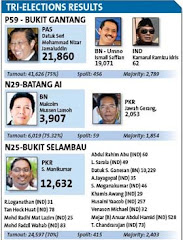

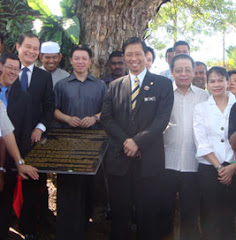

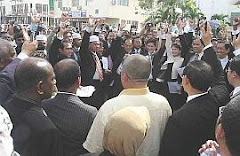
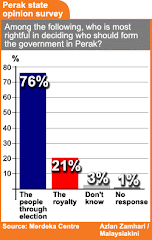


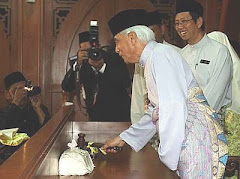
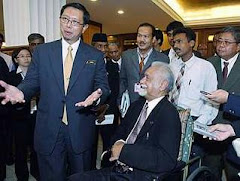






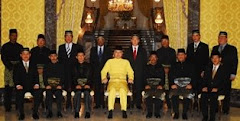

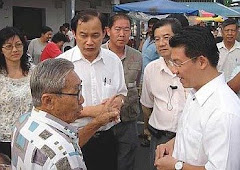
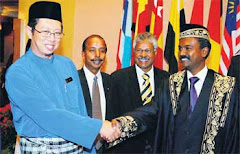

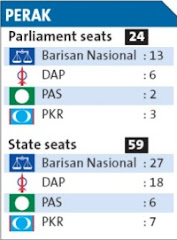

No comments:
Post a Comment